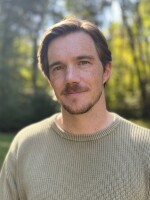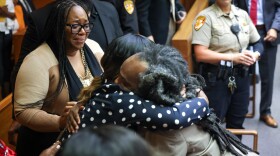Howard Dudley spent nearly 24 years in prison after being wrongfully convicted of sexually assaulting his 9-year-old daughter, Amy Moore. A few days before Christmas, 30 years after the initial verdict, North Carolina Governor Roy Cooper pardoned Dudley.
In a recent conversation with WUNC's Tested Podcast, Dudley reflects on what he’s been through over the years, and how it feels to finally have his innocence publicly acknowledged.
The following transcript has been edited lightly for length and clarity.
On his early life
"I grew up in the area right out from Kinston. And I love life. My mama and daddy raised five boys and five girls. I'm a person that came up on the strict rules and regulations of Wayne and Phyllis Dudley. They made those rules and they enforced them, and we always carry them everywhere we go. Right now today, those voices are still lingering in our hearts."

"I'm a guitarist. I started back in elementary school, probably when I was around 11. I asked my dad about buying a guitar. He would never buy me one, so my oldest brother asked him about buying one. My oldest brother came home one day and I was on the porch just banging away [on the guitar]. And so he came up and caught me, and he said, 'Give it here, give it here!' and I took it and slammed it against the deck and busted it. Lord have mercy, when my daddy got home... We talk and laugh about it now but my daddy, he really wore me out. Ain’t no doubt about it. And I never forget it."
Becoming a father, and losing so much of fatherhood
"My son, Dennis, when I left home he was two years old. It hadn’t been long since he started walking. He’s playing for Mary J. Blige now. I’ve got pictures of him with Michael Jackson. He’s just a big-time musician. He gets on the airplane with his guitar and works with all the big-name people. And you know what, we connect a little bit now, but it's not the relationship that I had intended when I left. I meant for us to be close as a family. Teaching them, instilling in them the morals and values of a father. I wasn't here to do that. They did a lot of damage to me, a lot of serious damage. And I had to live with it."

"So many lies were told. You know what I was guilty of? Breaking [Amy's mother’s] heart. That's the only thing I was guilty of. That was years before this. When I got married, all of a sudden I became a child molester. When you’re out there living that type of life, everybody’s heart gets broken…You’re young, you know, so it just happened. But I was taking care of my daughter, me and her had a relationship, she’d come spend the weekend with me. And then the thing that got me so bad was when I read that she said I got up on the bed and do this and do that. And I said, 'Oh, my goodness.' I said, 'No.'"
A botched investigation and an unjust trial
"I didn't know this until Duke Law School told me, but [the court-appointed lawyer] spent an hour investigating. And I was told that Amy was taken to the clinic by her mother, because she had blood in her clothes and I was supposed to have done that. And so years later, when Duke Law School got investigating my case, they go here to the clinic to talk to the doctor that supposedly discovered the blood in the clothes. He said he didn’t treat her for that. He treated her for rash and headaches. Her mama got on the stand and lied. This is the type of stuff that sent me to prison... He had access to it, my first lawyer. I try not to even think about it because it can be hurtful."
"I cannot understand how twelve jurors came out and said 'Guilty,' with no evidence, no — absolutely nothing. I don't understand that."

Holding on to the truth
"You know, my heart goes out to people that I spoke to in there, that confessed to things that they didn't do. One guy had been 37 years in there for a crime he didn't do. And I tried to get him not to do it. But you know, we had to make our own choices. And that's what he did. He took the [plea] deal. I'm going to make choices that I can live with. Once I learned how to function [in prison] I could live with myself. I could get up every morning, I could look at myself in the mirror. I didn't walk around with a guilty conscience. Because I knew I didn't do anything. They knew I didn't do anything. And so I said, well, people out there are working on this right here. So hopefully something might break for me."
"In prison, you have to sit around and ponder this stuff. And when you start pondering, you ponder what's in your best interest. So I came to the conclusion that I was gonna stick with the truth. If I had to spend the rest of my life in there, I was not going to give them that luxury to say that I did something that I did not do. I tell everybody that the only thing I had to fight with was the truth. And I wasn’t about to give that up. That's something I could control: truth."
"That's part of having to deal with what comes your way. You have to function with what you’ve got, what you feel comfortable with, and that's what I did. I wasn't willing to sit here and say, 'I molested my nine-year-old daughter.' No way I was gonna say that."
Going home
"When I was down at Johnston County, a volunteer came into the prison system ministry and I talked with him about my case. He told me to write Duke Law School’s [Innocence Project]. And so I wrote them a letter about what had happened to me... And now this is beginning to look strange to them. They said, 'Something isn’t right here, Mr. Dudley.' And they took my case... They got investigating and it was worse than what they thought it was. So, you know, they saved my life."
"I got back in court and, you know, you get so many letdowns, you can become kind of numb to letdowns. I was sitting down with Ms. [Theresa] Newman from Duke Law School, and she was holding my arm. I was glad she was, because I was a little nervous. I could tell when things got going good, because she would look back at my family with a little smile. So I knew we were doing pretty good now. And the judge said, 'I've heard enough.' He looked back at me and said, 'Mr. Dudley, you're going home today.' And I nearly fainted. I said, 'Did he say what I thought he said?' Ms. Newman looked back and started smiling, and I didn't want to look at my family, because if I did I knew they’d break down and I’d probably break down too."

"After I got out in March of 2016, my sister who saw me get out passed away the next month. [While I was incarcerated] my wife passed away. My mother passed away, relatives passed away. These are things that I had to suffer, for no reason at all: not being able to see my children graduate, not being able to go to the football games, not being able to afford to raise them. I’ve got a picture of my son standing in prison. They had to drag him out."
"When you’ve been in a situation like I was and you come back home, there's just so many things running through your mind. The streets have changed. A lot of people that were here when you left, they are no longer here. My brother came and asked, 'You know who this is right here?' I said no. He said, 'It’s your granddaughter.' She came over and she hugged me. I said, 'What's your name?' And here was another granddaughter, and a grandson. These are some of the things that I had to endure."
Being pardoned and trying to move on
"I went to the store that morning to grab a sandwich and I was on my way back home when I got the phone call from Ms. Newman. She and Jamie [Lau of Duke Law Wrongful Convictions Clinic] were on the phone together, singing a song. They said, 'We've got some good news for you Howard. The governor just granted you a pardon.'"
"I pulled off the road and I asked her to say it again. I kind of pinched myself to make sure I wasn't asleep. I said, 'Miss Newman, you say what?' 'You just got your pardon!' And I sat there and dropped my head and almost shed a few tears, but, you know, that was a great moment."
"I hate what happened. But if I don't forgive, I'm going back into another prison, a mental prison, and I don't want that. I'm out here now. I'm enjoying my life. They can't bring those 24 years back. They can't bring my mama back. They can't bring my wife back. They can't give me back the ability to see my children play ball and raise them up again."
"Amy worries me. She says, 'Daddy, I know I owe you an explanation.' And I say, well, that's up to you. I take her out to eat, I take her to get groceries. We ride out every night. You know, I was a good dad. She knows it. And so I never convinced her. She came to see me when I was in prison. I don’t talk about it but if she wants to talk about it, I listen to her. The only thing I tell her about this is that you’ve got to learn to forgive and move on. You can't change anything, like I can't change anything. I do not hold you responsible. I'm out and you helped me to get out. Let’s move on."









